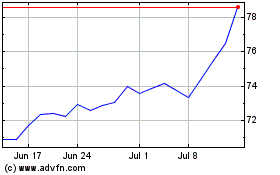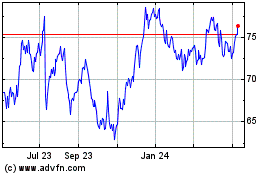By Simon Constable
The three largest index-fund managers have grown so big that
they ultimately could hamper the performance of public companies
and the economy, according to research from corporate-governance
scholars.
The researchers -- Lucian Bebchuk, professor of law, economics
and finance at Harvard Law School, and Scott Hirst, a law professor
at Boston University School of Law -- recently published two papers
that raise issues for investors.
Together, the largest fund managers -- BlackRock Inc., Vanguard
Group and State Street Corp.'s State Street Global Advisors --
control an average of one in five shares of S&P 500 companies,
and that portion is likely to jump to more than 33% of shares over
the next two decades, the professors say in a working paper issued
by the National Bureau of Economic Research in June. The fund
managers own 16.5% of shares in companies in the Russell 3000
index, the research shows, a total that the professors say could
grow to 30.1% over the next two decades.
Also, these large fund managers collectively fall short in their
role, as shareholders, of oversight of public companies, the
researchers find in a second report to be published later this
year.
"We show and document that the Big Three have incentives to
underinvest in stewardship and to be excessively deferential to the
corporate managers of portfolio companies," says Prof. Bebchuk.
"Given this analysis and empirical evidence, we worry that the
increased concentration of shares in the hands of institutional
investors will not produce the improved oversight of public
companies that would be beneficial for public companies and the
economy," he says.
Leaders at BlackRock, Vanguard and State Street all disagree
with the analysis, saying that they act in the best interests of
their shareholders.
The professors also say that the influence of the fund firms is
greater than the portion of shares they own. These three firms are
together responsible for 25% of the votes cast in company ballots
for S&P 500 companies and 22% of the votes cast at Russell 3000
companies, the paper says.
If the same relationship between control of shares and votes
cast holds in the future and the funds' ownership of shares grows
as predicted, then the three index-fund companies could together
account for more than 40% of all votes, on average, on shareholder
resolutions at S&P 500 companies.
Cautious approach?
In their second report, due to be published in the December 2019
issue of the Columbia Law Review, Profs. Bebchuk and Hirst say the
index firms are found to be extremely cautious when it comes to
their own spending on corporate stewardship or taking action to
change the way public companies do business.
The three fund managers "very rarely" oppose corporate managers
in votes on executive compensation "and are less likely than other
investors to oppose managers in proxy fights against activists,"
says the new report.
"Our analysis of the voting guidelines and stewardship reports
of the Big Three [BlackRock, Vanguard and State Street] indicates
that their stewardship focuses on governance structures and
processes and pays limited attention to financial
underperformance," the report continues.
These firms don't agree with the professors' conclusions.
Last year, State Street voted against 266 companies on
pay-related issues and took more action against company directors
than advisory firm Institutional Shareholder Services recommended,
says Rakhi Kumar, head of ESG (environmental, social and
governance) investments and asset stewardship at State Street. At
the same time, the firm takes a nuanced approach to activist
proposals, she says: "We also have to hold activists
accountable."
In a statement, Vanguard said that voting is "only one part of
the larger corporate governance process. We regularly engage with
companies on our shareholders' behalf and believe that engagement
and broader advocacy, in addition to voting, can effect meaningful
changes that generate long-term value for all shareholders."
Asked for comment, BlackRock pointed to multiple past comments,
including Chief Executive Officer Larry Fink's 2018 letter to
shareholders and the company's ViewPoint publication of July 2018.
"We must be active, engaged agents on behalf of the clients
invested with BlackRock," Mr. Fink said in his letter to
shareholders. "This responsibility goes beyond casting proxy votes
at annual meetings -- it means investing the time and resources
necessary to foster long-term value."
What they spend
The professors' coming paper asserts that the amount of cash the
three fund-management firms spend on corporate governance is
minuscule.
"We show that the Big Three devote an economically negligible
fraction of their fee income to stewardship, and that their
stewardship staffing enables only limited and cursory stewardship
for the vast majority of their portfolio companies," the report
says.
The professors estimate that spending on stewardship by
BlackRock, Vanguard, and State Street is less than 0.2% of the fee
income each receives. Staffing also is thin, the professors
say.
BlackRock's July 2018 ViewPoint publication states: "BlackRock
has over 30 professionals in this area, which represents the
largest dedicated investment stewardship capability in the asset
management industry to our knowledge, and we have announced plans
to continue to invest in this function." BlackRock also said in
that publication that some clients choose not to delegate voting
authority to BlackRock. That's the case for around 9% of the shares
that BlackRock holds in funds with so-called "equity mandates," the
company said; those are funds that are set up to hold stocks. The
firm has also stated that proxy services can hold even greater
influence over shareholder votes.
Vanguard says it has "invested considerably" in stewardship.
"They are using a framework that for us is not relevant," says
State Street's Ms. Kumar, pointing to extensive thought-leadership
work that the company believes influences corporate behavior.
Mr. Constable is a writer in Edinburgh, Scotland. He can be
reached at reports@wsj.com.
(END) Dow Jones Newswires
July 08, 2019 22:19 ET (02:19 GMT)
Copyright (c) 2019 Dow Jones & Company, Inc.
State Street (NYSE:STT)
Historical Stock Chart
From Mar 2024 to Apr 2024

State Street (NYSE:STT)
Historical Stock Chart
From Apr 2023 to Apr 2024
